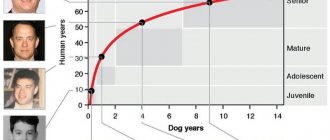Like people, the duration of wakefulness of four-legged pets primarily depends on age. Puppies and older animals spend the most time in the kingdom of Morpheus.
But there are other factors, including some that can pose serious health risks. For this reason, every responsible owner should know how many hours a day a dog needs to sleep and in what cases it is recommended to take it to the veterinarian.
How many hours a day should puppies sleep?
The child's body spends a large amount of energy on the growth and development of the body. Because of this, babies are less awake than adults.
Less than 3 months
The norm for newborns is 20 hours a day. They wake up only to eat and practically do not react to external stimuli.
INTERESTING!
Newborns sleep 90% of the time, and adult animals only 50%, distributing the remaining 20% and 30% between an active lifestyle and lazy wallowing while maintaining alertness, respectively.
3-6 months
At this age, four-legged pets become more active. By 3 months, they have full control of their body and begin to walk and run, exploring the previously inaccessible world around them. Their sensitivity increases and their reaction improves.
Night sleep becomes more restless and is easily interrupted by loud noise or bright lights. The recommended norm is reduced to 16-18 hours.
More than 6 months
After six months, the most active period of life begins. It lasts up to 1.5 years. The animal’s body becomes more resilient and fully restores the strength spent during the day within 12-14 hours.
Proper nutrition
When starting to care for your Chihuahua at home, you should pay special attention to the proper diet. It is appropriate to talk about this with the former owners or a nursery worker.
If the puppies are already accustomed to dry food, then they should continue to feed it. The main thing in this matter is to choose expensive super premium food and monitor the state of fresh water in the bowl.
Natural feeding with natural food will require you to spend time and energy thinking about the menu, but it is less expensive financially. So if you find this option more acceptable for yourself, gradually accustom your dog to natural food.
At the age of 1 to 5 months, the dog eats 6 times a day, after this age - 4-5 times a day, and so on. Until the portion becomes quite large (given the size of the Chihuahua, “large portion” means about half your meal). Chihuahuas are fed even at night if the little puppy is hungry, because he is used to his mother and will look for food, whine and wake you up. You can, of course, pat the baby on the head and calm him down, but it would be more advisable to feed him so as not to make him hungry.
How much sleep should an adult dog sleep?
After growing up, the process starts in the opposite direction. The norm does not decrease, but gradually increases, which is explained by the gradual slowdown of all vital processes.
Young
Young animals sleep 12-14 hours a day. The recommended rate can only be increased as a result of the influence of internal and external factors, which will be discussed below.
Elderly
Older dogs, like puppies, sleep 18-20 hours a day. Most often, they fall asleep immediately after lunch or a walk outside. This is explained by the fact that in old age it takes much longer to digest food and recover from physical activity.
Four-legged oldies are distinguished from puppies by only one thing - a more sensitive reaction to stimuli. Because of this, they often wake up from extraneous sounds, tasty smells and touches of the owner.
Newborn nutrition
In addition, in order to choose the right diet for your dog, you, as its owner, need to get used to discipline from the very first days, because the baby is like a child and requires following a feeding schedule from the very first day at your home.
In most cases, people take dogs home after the baby turns 2 months old, when the breeder has completed all the vaccinations and the animal can eat on its own. But sometimes information about what to feed newborn puppies or one-month-old babies is even more important, so we consider all cases and really start with them.
In dogs, as in humans, the best food for newborn puppies is mother's milk. But cases are different, and if the mother for some reason cannot be breastfeeding, breeders have one more problem. The most accessible is cow's milk, but it is not suitable for feeding babies, since bitch's milk contains twice as much protein, calcium and phosphorus as cow's milk.
In the case of puppies, the difference in feeding will depend on the difference in age, every week matters!
There are two options to solve this problem:
- Improve the existing option with cow's milk by adding 1 chicken egg yolk, 1-2 drops of vitamin A and D, and 2-3 ml of 5% vitamin C to 100 grams of milk.
- Use an industrial formula for newborn puppies, which is quite easy to buy at a pet store.
There is an opinion that from birth you can feed puppies with baby food, such as, for example, “Malyutka”. This is not the best option, since the digestive systems of dogs and humans are fundamentally different.
An excellent substitute for mother's milk for newborns are the following mixtures:
- Royal Canin;
- Hartz;
- Proplan;
- Beaphar;
- Canina Welpenbrei.
How to feed a newborn puppy? To do this, you can use a regular baby bottle, and very tiny puppies can eat from a pipette or syringe without a needle.
We talked about how to feed puppies with formula milk yourself. What natural products can be given as first complementary foods and at what age should this be done?
Already at two weeks of age, babies can be fed, namely, given a scraper - scrape raw veal or chicken meat with the back of a knife and those fibers that have become detached and rolled into balls can be fed to the puppy. At first this ball should be the size of a match head, and every day increase it to the size of a pea.
The calculation of the daily feeding rate for puppies can be found in this table:
| Baby's age/days | Mom's weight | ||||
| Up to 5 kg | 5-10 kg | 10-20 kg | 20-30 kg | Over 30 kg | |
| 2-3 | 30 ml | 70 ml | 90 ml | 120 ml | 170 ml |
| 7 | 40 ml | 90 ml | 120 ml | 160 ml | 230 ml |
| 14 | 60 ml | 130 ml | 180 ml | 250 ml | 340 ml |
| 21 | 80 ml | 180 ml | 240 ml | 330 ml | 460 ml |
| 28 | 100 ml | 220 ml | 300 ml | 410 ml | 570 ml |
Let us repeat once again - this calculation is for self-prepared milk formula or purchased. You should not give baby food to your four-legged friends, as this can cause overfeeding and problems with bowel movements.
To understand whether you are doing everything right, keep track of how many grams the puppy should gain and what your results are. An equally pressing question is how many times a day should a puppy be fed for up to 1 month? Newborn babies are fed to their mother every 3 hours, so for artificial babies it is necessary to create the same feeding schedule.
Breeders claim that the most difficult and troublesome thing is to feed a one-month-old puppy, but at two months of age, artificial babies are still at risk. An important question that the owner needs to decide is not only what to feed the puppy per month. At the end of this period, mandatory vaccination and deworming must be carried out.
What determines how long your pet sleeps?
In addition to age, the following factors influence sleep duration:
- Body size.
The smaller your pet, the faster its body recovers.
- Breed.
Toy breeds and companion dogs sleep the hardest, as they are not designed to guard, herd, or protect livestock from predators.
- Activity level.
After a long walk and active games on the street, the animal always sleeps more and more soundly than usual.
- Excess weight.
With obesity, daytime sleepiness and frequent awakenings are often observed, which negatively affect the dog’s general well-being.
- The weather outside the window.
The longest duration is typical for cloudy weather and cold seasons. This is due to the lack of sunlight, which affects the biological clock.
- Boredom.
If your pet does not know how or does not want to entertain himself, then during your absence or busyness he will sleep.
- Stress.
Occurs when there is an inability to adapt to a specific stimulus. The danger to the body is the chronic form, which develops when nervous tension persists for a long time.
- Presence of diseases.
Infections, parasitosis, pathologies of the heart and kidneys, arthritis and poisoning greatly exhaust the body. They can either increase or decrease the total duration of sleep. These pathologies can be recognized by the accompanying symptoms.
If your pet sleeps for a suspiciously long time, and in addition to lethargy and drowsiness, he is bothered by a high temperature, vomiting or other alarming signs, contact your veterinarian. This condition is not normal and can lead to serious complications if left untreated.
When should you contact a veterinarian?
Dr. Potoski says, “I would recommend taking your dog to the vet if he becomes extremely lethargic. Anything that goes beyond her usual behavior should alert you and be a reason to visit a specialist.” As a dog owner, you are the best person to tell what dog behavior is normal and what worries you. When you see changes that are concerning, consult your doctor!
No wonder they say that a dog is man's best friend. Many of us love them as much as we love family members, and taking care of their health is just as important. This is another reason to find out how long dogs should sleep.
Source
Stages of sleep and dreaming
Four-legged pets, like their owners, dream. This fact was proven by scientists from the University of British Columbia, who compared the results of an EEG (electroencephalogram) of a person and six English pointers. The stages also coincide:
- Slow or deep.
Necessary for restoring the body's strength. Occurs shortly after falling asleep. Accompanied by measured breathing, decreased muscle tone and complete immobility of the eyeballs. When suddenly awakening, the animal needs time to assess the situation and come to its senses.
- Fast or superficial.
Follows immediately after the slow stage. Brain activity at this moment is close to the state of wakefulness, so even a slight rustle is enough to awaken. The main sign is active movement of the eyeballs.
The change from a slow stage to a fast one is called a cycle. During one dream there are from 4 to 6 cycles with short-term wakefulness. It is necessary to change posture so that the body does not have time to become numb from being immobilized for too long.
Direct dreams are observed in both stages. The longest and most emotional ones are typical for fast ones. They are the ones that remain in memory for some time.
INTERESTING!
According to the research of Professor Matthew Wilson from the Massachusetts Institute of Technology, in the deep phase animals experience events that have already occurred, and in the slow phase they experience possible options for their development. They are mainly associated with pursuit and hunting.
Causes for concern?
The best way to check if your dog is sleeping too much is to see if there are any changes in his habits. Perhaps she used to like to play for a while after you got home, but now she just stays in bed? Or, for example, your dog used to love to watch you cook and beg for tidbits for himself, but now he is not interested in this and prefers to nap? Or has she stopped greeting you at the door when you come home?
Recommended daily routine
Animals, like people, are characterized by cycles. They adapt to a certain rhythm, often copying their owners.
INTERESTING!
Most often, lap dogs adopt human habits, while representatives of hunting breeds, on the contrary, prefer to live exclusively in their own rhythm.
The daily routine is usually disrupted in puppies during the period of adaptation to a new home and in dogs that lack activity. In the first case, the problem resolves itself, but in the second, it often gets worse and develops into deviant behavior. To avoid negative consequences, you should adhere to the following schedule:
- Morning walk and breakfast.
Try to get up at the same time so as not to make your pet needy or hungry for too long.
- Daytime sleep.
While you are at work, your pet is likely to sleep soundly until you return. He gets up only to drink or check the cause of suspicious rustling noises outside the door or window.
- Evening walk and dinner.
Another step outside is necessary not only to empty your bladder, but also to get well exhausted before falling asleep.
- Night sleep.
Try to go to bed together so as not to set a bad example for your pet.
On weekends, it is recommended to increase the amount of activity. Take your pet to the park where he can run freely without a leash and play with other animals. Regular outings in nature will help you maintain good physical shape and a healthy musculoskeletal system, and will also make it easier to fall asleep.
Signs of lack of sleep
The best way to tell if you're getting enough sleep at night is to take stock of your condition during the day. Although people who are used to constantly “saving money” on their vacation may no longer remember what it’s like to truly be awake, to be as concentrated as possible. But there are certain signs that a person is not getting enough sleep.
You may be sleep deprived if:
- need an alarm clock to wake up on time;
- you can reset the alarm clock for a few more minutes after the ringing;
- difficulty waking up and getting out of bed;
- you feel sluggish during the day;
- you can switch off in a meeting, in classes or in an empty office;
- feel drowsy while driving and after eating;
- need a nap during the day, at least for a short time;
- fall asleep quickly while watching TV;
- on weekends you can sleep much longer than on weekdays;
- fall asleep within 5 minutes of getting into bed.
Posts 1 page 20 of 24
Share112.11.2015 08:47:51
Good afternoon, our baby is 2 months old. I feed 5 times a day, the last feeding is at 12 at night, but this awl wakes up after a couple of hours and whines, scratches the fence, and generally screams like someone wounded in the butt. We live in an apartment building, the neighbors can hear everything, so we try to calm him down, sometimes with a word, sometimes by the scruff of the neck, but to no avail. It will just calm down and after 2-3 hours everything will start again. The veterinarian advised to ignore it. But how? It’s night on the street, behind the wall people sleep in the morning on their way to work/school, there’s an old woman, and there’s an unbearable squeal, and to be honest, I just can’t stand this torture, I go and calm him down. Share your experience with advice on how you survived this period, until what age puppies do not sleep and require attention. Ignoring is not an option for us, no longer out of pity for our pug, but out of pity for our neighbors, who are not guilty of anything. I want to sleep, damn it!
Announcement
WELCOME TO THE BEAGLE BREED LOVERS FORUM!
You are a Newbie and only 15 days from the moment of registration on the forum and 30 messages separate you from the next status and remove all restrictions, more >>
ATTENTION! You cannot leave comments in the PUPPIES sections! comments from the topic author are allowed!
ATTENTION! You cannot leave comments in the PUPPIES sections! comments from the topic author are allowed!
ATTENTION! You cannot leave comments in the PUPPIES sections! comments from the topic author are allowed!
ATTENTION! You cannot leave comments in the Let's take a beagle into good hands section! comments from the topic author are allowed!
ATTENTION! You cannot leave comments in the Stud dogs section! comments from the topic author are allowed!











